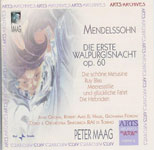Mendelssohn has a reputation as the polite classicist among members of the first wave of German Romantic-era composers, and performers normally can’t go wrong in keeping his Classical clarity to the fore. Peter Maag’s particular achievement in all five works on this disc is to maintain clarity of form and good taste, but at the same time to make each piece burst with Romantic turmoil. The best-known work here, the Hebrides (or Fingal’s Cave) Overture, is a touristic depiction of a turbulent boat ride among Scottish islands. But Maag discovers fearsome feelings and perhaps some personal disturbances to shadow the musical seascape. All four overtures on the disc have this same quality of digging down beyond the usual Mendelssohn veneer of charming gentlemanliness.
The cantata The First Walpurgis Night is one of the few instances of Mendelssohn getting overtly rowdy. Goethe’s text depicts some hold-out practitioners of the Druid religion forecasting their own doom at the hand of their conquerors, the intolerant Christians. Dire as their fate is, the pagans (as is usually the case) seem to be having the most fun, and Maag really lets it fly. The performance is fierce, and again Maag brings out a rare undercurrent of the personal–the listener can readily sense rage as Mendelssohn recalls the persecution the Catholic “dull Christian priests” (the piece’s villains) dispensed to his Jewish ancestors and to the Protestant fathers of his family’s adopted faith.
From the first moments of this disc it is clear that these are live radio tapes, not up to the standard of the best modern recording technology. (The cantata dates from April 2, 1972 and the overtures from October 19, 1979.) However, the powerful sense of presence and natural balance the original RAI masters achieve reverses any negative impression. The sound is superior to many sterile high-tech recordings, and the remastering is exceptionally good, in 24-bit/96 kHz domain.
Maag has the RAI Symphony (and the chorus in Walpurgisnacht) at top form. Although the performances obviously are not equal to the technical prowess of the Cleveland Orchestra and Chorus under Dohnanyi in the cantata or the London Symphony under Abbado in the overtures, the playing is high-caliber, and the overall sound has the feel of operatic drama. The trio of vocal soloists in Walpurgisnacht is something of a liability, but in spite of their stentorian, unpretty European “cantata” style, all three singers get into their roles and are totally convincing once the performance gathers steam. Arts Music appears to be on a Maag project, resuscitating several of the Swiss conductor’s radio tapes, including both Maurice Ravel operas. If the current level of quality is maintained, this is a series to look for with interest.
































